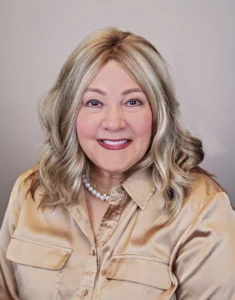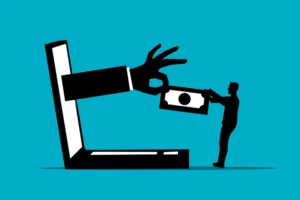Nine years ago, Lisa Schiller was featured in the September 2015 edition of In Focus. It was so long ago that the issue is no longer archived online. Schiller talked about her job as the Director of Investigations and Media Relations at Better Business Bureau Wisconsin, her time at UWM as a nontraditional student working toward a major in communication (she graduated in 2001 and later returned to UWM to earn a Bachelor of Science in criminal justice in 2014), and her job uncovering scams and other shady business practices that impact consumers.
In 2024, Schiller is still in her role at the BBB and still working to educate and protect consumers. She sat down to talk about her job once again, this time to share how scams have changed, the risky scams she’s seen, and the wisdom she’s gained over the last several years.
When we last spoke, the world looked a lot different. What has changed in your work over the last nine years?
COVID happened and that really changed everything. As far as the BBB, one of the changes that we saw was the reporting of online scams in particular. Since Covid, complaints regarding online shopping websites increased. In fact, that was the riskiest and most reported scam to our BBB Scam Tracker for the last three years.

We just released our new Top 10 Riskiest Scams list in March and the riskiest currently is investment/cryptocurrency. We also continue to receive reports of romance scams, puppy scams, online vehicle sales scams – anything involved with being online and shopping remains a common thread.
We are also seeing a shift in who (is getting scammed). Older Americans were for a long time were commonly shown to be victims of the most scams, but we’ve actually seen a shift and it’s now (people) aged 18-24. We need to focus our attention on educating this group and making sure that they know what the Better Business Bureau is and how they can utilize it, and encourage them to do their research and report scams they encounter.
Why are young people now the largest demographic that are victims of scams?
I think it’s the younger generation that are online the most. If they don’t know about online shopping scams, if they’re not reading our press releases or seeing our stories in the media … they might not necessarily know how common online shopping scams are and what to look for. For example, people in all demographics need to realize how important it is to safeguard their personal information, because if it gets in the hands of the wrong person, it can do a lot of damage that will take a long time to fix.
After doing this a while, you’ve gotten very good at protecting people. I understand you just won a national award for your work.
It was a first place national award for media engagement. One of my jobs is securing “earned media,” which basically means getting our name and our brand (Better Business Bureau or BBB) through all means of media and media outlets without paying for that exposure.
The award was a first place award for media engagement, including a record number of local and national media pick up (700+ outlets). It was on a unique press release subject concerning trends relating to a new lottery winner impersonation scam reported to our BBB Scam Tracker, and alerting the public in an attempt to educate and prevent people from becoming victims. It was about a gentleman who won the lottery a couple of years ago in Wisconsin, in the Milwaukee area, actually. The Powerball lottery winner was reportedly known to have visited Target stores and hand out gift cards. He would see a woman, for example, maybe shopping in an aisle that sold baby items such as diapers and he would hand out a gift card.
So con artists were sending out massive amounts of text messages posing as this lottery winner to say, ‘I want to share my wealth and you are one of the lucky ones.’ People got the text message and they believed it. The scammers were able to link to some of the news stories (about the lottery winner) to perpetuate the scam.
After working in business and public information world for all these years, what do you see as the value of a college degree today?
As the Senior Director of Investigations and Media Relations, I investigate businesses and scams, write reports, refer cases to law enforcement and agencies, write press releases, work with the media doing interviews, and community outreach. As we increasingly receive more and more requests to give presentations to groups about scams and other topics, I find myself busy doing that and connecting with the various communities in our state. I value and appreciate the education I received from the University of Wisconsin.
As you know, graduation is approaching. After building a career at the BBB, do you have advice for new graduates about how to find a workplace where they can thrive?
That is so important. Older generations (like my generation!), we stay in a place of employment typically for a long period of time. I feel like the newer generations tend to move on a bit more quickly, maybe if they find themselves becoming unhappy, which isn’t necessarily a bad thing!
My advice would be to decide what makes you happy, even if it’s a job that isn’t going to make you rich. It will still give you fulfillment and I think that’s even more important than a job that pays you a lot of money but doesn’t give you satisfaction. So know what you want to do, or have an idea, and then also seek out a company that is the best fit for you. You have to do a little research so you know about that company. If you’re going in for a job interview, that will speak volumes and makes that person stand out. Of course, start your search at BBB.org!
By Sarah Vickery, College of Letters & Science
